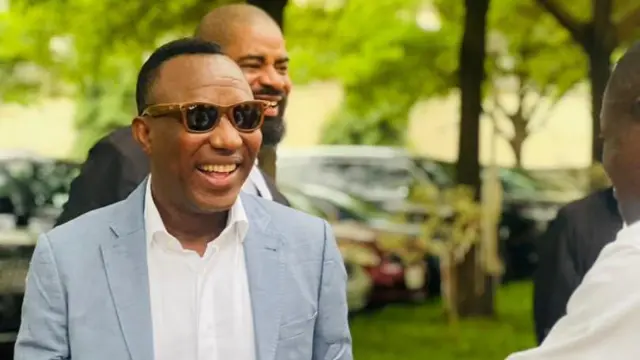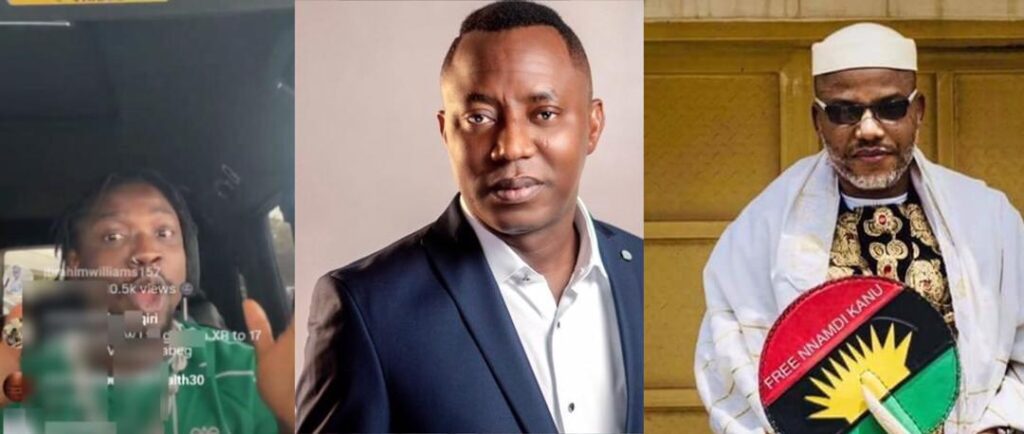Now Reading: 5 Alleged Reasons Omoyele Sowore Was Arrested by the Nigerian Police
-
01
5 Alleged Reasons Omoyele Sowore Was Arrested by the Nigerian Police
5 Alleged Reasons Omoyele Sowore Was Arrested by the Nigerian Police

Human rights activist and Sahara Reporters publisher, Omoyele Sowore, was reportedly arrested by officers of the Nigeria Police Force on Thursday, October 23, 2025.
His arrest has stirred nationwide conversations about freedom of expression, political intimidation, and police accountability.
According to multiple reports from Daily Post, Punch Newspapers, and Premium Times, Sowore’s arrest stemmed from several petitions and allegations lodged against him.
The police claim that his actions violated certain sections of Nigeria’s criminal and cybercrime laws a claim his supporters strongly dispute.
Here’s a breakdown of five key reasons reportedly behind his latest arrest.

1. Alleged Forgery of a Police Document
The most serious allegation against Sowore involves the forgery of a police wireless message. According to police statements, Sowore allegedly circulated a falsified internal document purporting to be an official police communication.
Investigators from the IGP Monitoring Unit claim that the document was “maliciously manipulated” to mislead the public. Sowore, however, has denied the charge, saying it’s another attempt to silence critical journalism.
2. Cyberstalking and False Publication
Another major accusation is cyberstalking and the publication of false information, allegedly targeting certain individuals and law enforcement officers.
Under Nigeria’s Cybercrime Act, cyberstalking refers to the online harassment or defamation of another person. Police sources allege that Sowore’s online platforms — especially Sahara Reporters — were used to publish defamatory materials.
Civil rights advocates, however, argue that such charges are often used to criminalize investigative journalism.
3. Refusal to Give a Formal Statement
Reports indicate that Sowore was invited by the police for questioning and later detained after allegedly refusing to provide a formal written statement.
According to PM News Nigeria, the activist maintained that the allegations were politically motivated and declined to cooperate until he consulted his lawyers. The police have since cited this refusal as one reason for his continued detention.
4. Arrest After Honoring a Police Invitation
Sowore’s legal team confirmed that he was arrested after voluntarily honoring a police invitation. He was reportedly invited by the Inspector General of Police (IGP) Monitoring Unit, a high-level investigative team in Abuja.
While honoring such invitations is standard practice, activists and legal analysts have criticized the move, calling it “a betrayal of trust” when an invited citizen is subsequently detained without immediate charge.
5. Alleged Criminal Defamation
One of the petitions reportedly accuses Sowore of criminal defamation a charge rooted in sections of Nigeria’s Penal Code.
The complaint claims that Sowore published damaging and unverified claims against senior police officers and public figures. His team insists that all published materials were in line with journalistic duty and public interest reporting.
Police Deny Torture Claims on sowore
Following viral reports that Sowore was injured during his arrest, the Nigeria Police Force publicly denied any torture or physical assault. In a statement released through the Force Public Relations Officer, the police stated that Sowore “was treated with dignity” and that his arrest followed due process.
However, Premium Times reports that eyewitnesses claimed Sowore suffered a broken hand during a forced transfer between detention cells — an allegation yet to be independently verified.
Reactions and Wider Implications
Sowore’s arrest has reignited debate over Nigeria’s press freedom and the growing use of cybercrime laws against journalists and activists. Civil society groups, including Amnesty International Nigeria, have called for his immediate release, labeling the charges “politically motivated.”
This is not Sowore’s first run-in with law enforcement. In 2019, he was detained by the Department of State Services (DSS) for calling for a “#RevolutionNow” protest. His latest arrest adds to a long list of controversies involving his activism and political engagement.
Arresting Sowore but overlooking bandits that publicly sit down to negotiate peace deals. Jokers.
— Daniel Regha (@DanielRegha) October 23, 2025
Whether this new wave of allegations will hold up in court remains to be seen. What’s clear is that Omoyele Sowore’s arrest has once again spotlighted Nigeria’s fragile balance between national security enforcement and citizens’ constitutional rights.
As the case unfolds, Nigerians and international observers are watching closely to see whether justice and due process will prevail.





